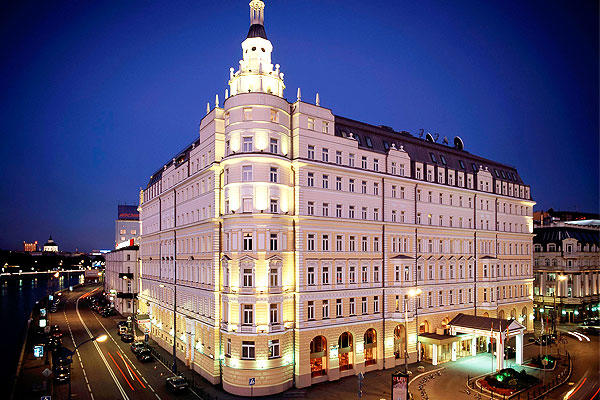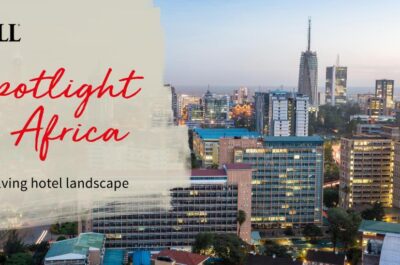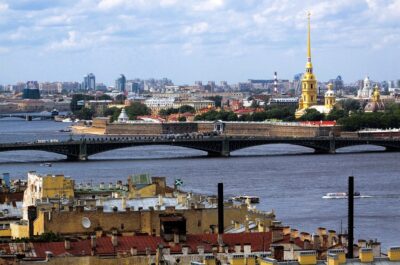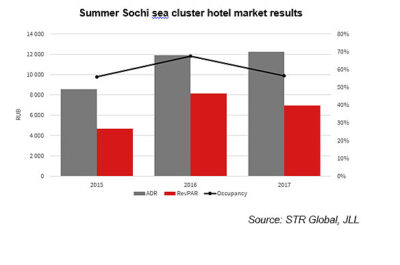YTD market-wide occupancy in Moscow quality hotels increased by 3 p.p. compared to the same period last year, exceeding 60%, while the average rate (ADR) grew by 3.6%, and reached RUB7,700. This resulted in a 10% increase in revenue per available room (RevPAR), to almost RUB4,550.
According to Tatiana Veller, Head of JLL’ Hotels & Hospitality Group, Russia & CIS, amidst the persisting limited availability of foreign destinations and continued growth of domestic tourism, Russian hospitality market is experiencing positive dynamics. For instance, Q1 2016 showed steady growth in operating performance of most market segments in two Russian capital cities.
YTD market-wide occupancy in Moscow quality hotels increased by 3 p.p. compared to the same period last year, exceeding 60%, while the average rate (ADR) grew by 3.6%, and reached RUB7,700. This resulted in a 10% increase in revenue per available room (RevPAR), to almost RUB4,550. In St. Petersburg, the average market occupancy slightly dropped in Q1 compared with the previous year (by 2.6 p.p.) to 44%, but this is still higher than in Q1 2014. Due to a significant increase in the average rate (by 9%, up to RUB4,000) the RevPAR in St. Petersburg hotels also increased (by 8%), reaching approximately RUB1,800.
“The luxury segment in both Moscow and St. Petersburg is leading the market, and through continued growth of rates and occupancy, is regaining positions after operational metrics’ slippage due to the fall of the ruble” Tatiana Veller commented. “In Q1 2016, Moscow luxury hotels registered record performance figures in occupancy and average rate for the last ten years – 59.1% and almost RUB16,800. In St. Petersburg, the demand for luxury hotels in Q1 2016 also reached the highest level in a decade: the occupancy was 41.8%, with ADR sitting at RUB10,700, which is almost RUB1,000 more than the previous record set in Q1 2015.”
The most affordable hotels in Moscow – midscale and upper midscale segments – registered conservative growth in number of rooms sold (a 1.5-2 p.p. increase in occupancy) and a slight drop in the average room rate in Q1 2016. In St. Petersburg the situation is reversed: quality hotels of these categories lost about 3-4 p.p. in occupancy, while marginally improving the average rate. As a result, the revenue per room in this category has remained approximately at the last year’s level for Moscow, while for St. Petersburg it fell slightly.
“All hotel segments on tourist markets usually experience significant growth both in occupancy and rates in the warm period – from May to September. For example, in St. Petersburg during these months last year, the hotels in lower price segments showed very high occupancy – from 80 to 85%, while maintaining strong pricing positions. These figures are the result of significant growth in domestic demand and group tourism from Asia, the traveling audience interested mostly in inexpensive accommodation.” said Tatiana Veller. “We can only hope that this year the trend stays, and hoteliers will be able to take advantage of the situation and continue to gradually increase the rates and, consequently, the profitability.”
Another hotel market worthy of a mention, fast gaining popularity in the current economic and political environment, is the quality Moscow Region resorts. In comparison with Q1 2015, these hotels significantly increased occupancy (by 16 p.p.), and reached 48% YTD, while in January, due to New Year and Christmas holidays, even exceeded 50%. The average rate has not changed from last year and remained at about RUB4,500. As tourists continue focusing on domestic destinations, we expect the traditionally high summer season to bring further occupancy and ADR growth to this sub-segment.
“In economically challenging times the planning horizons are typically shortened, especially in the MICE segment (corporate and business events). At the moment, we are observing the same trend of increasing spontaneity in travel planning by individual, less price-sensitive, tourists,” Tatiana Veller noted. “As a result, it has become difficult for hoteliers to make operational forecasts, even for a few months. Therefore, we cannot yet predict with certainty what the rest of this year will look like. But, at the same time, overall trends in the market are positive, and the coming months will show whether hotel markets of Moscow and St. Petersburg will be able to surpass the 2015 financial results.”
Theodore is the Co-Founder and Managing Editor of TravelDailyNews Media Network; his responsibilities include business development and planning for TravelDailyNews long-term opportunities.









































































































































































































